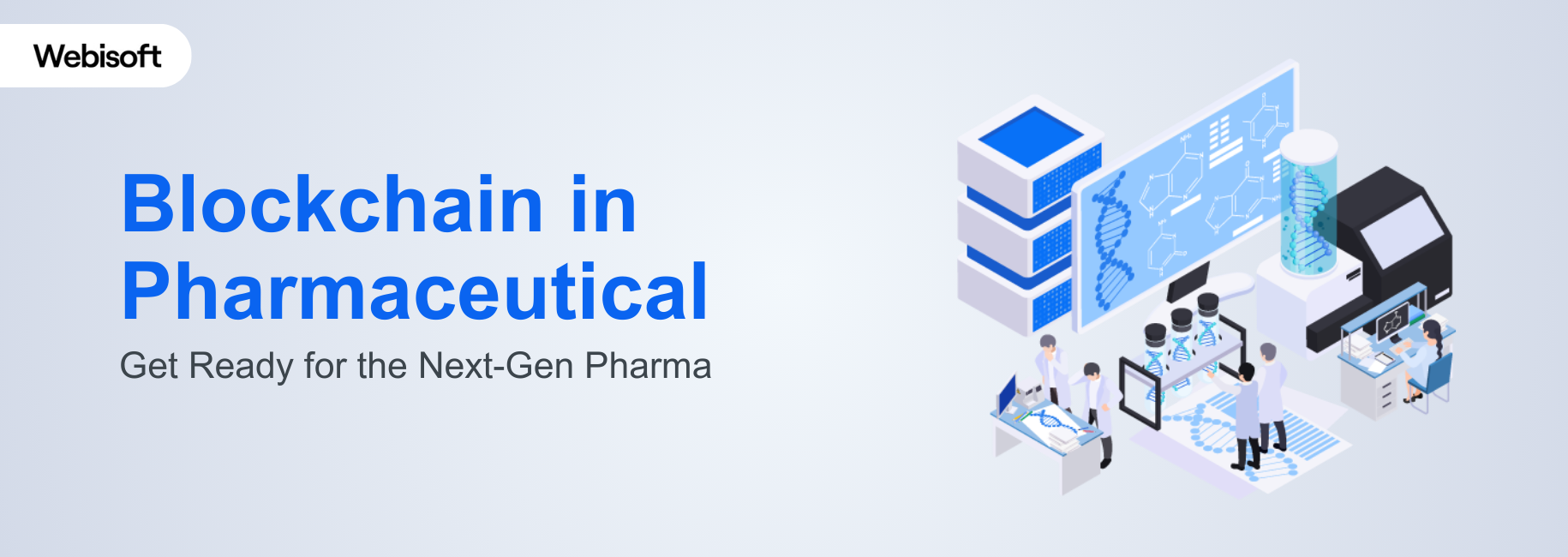The global pharmaceutical industry is massive, worth around $1.2 trillion, but it still faces significant problems with inefficiency. Surprisingly, using blockchain technology could potentially save over $100 billion for pharmaceutical companies each year. It’s clear that blockchain has the power to disrupt and greatly impact the pharmaceutical sector.
So, how does blockchain benefit the pharmaceutical industry?
Blockchain in pharmaceuticals improves drug authenticity, tracking, and data integrity, and secures data, reducing counterfeit drug risks. It simplifies supply chain management, automates compliance with smart contracts, and enables safe data sharing.
Stick around as we take a closer look at how blockchain in pharmaceutical makes a difference in the pharmaceutical industry. We’ll discuss its importance, benefits, real-world examples, challenges, and future trends. You’ll come away with a clear understanding of how this game-changing technology can transform pharmaceutical operations. Let’s start!
Contents
- 1 What is Blockchain in Pharma?
- 2 How can Blockchain Benefit Pharmaceutical Industries?
- 2.1 Counterfeit Drug Prevention
- 2.2 Supply Chain Management
- 2.3 Clinical Trials and Research Data Management
- 2.4 Regulatory Compliance and Quality Control
- 2.5 Patient Data Security and Privacy
- 2.6 Smart Contracts for Automatic Transactions
- 2.7 Streamlined Payments and Billing
- 2.8 Enhanced Collaboration and Innovation
- 3 Use Cases of Blockchain in Pharmaceutical Industry
- 3.1 Drug Traceability and Anti-counterfeiting
- 3.2 Supply Chain Management
- 3.3 Clinical Trials Data Management
- 3.4 Regulatory Compliance and Auditing
- 3.5 Intellectual Property Protection
- 3.6 Patient Data Management
- 3.7 Smart Contracts for Efficient Transactions
- 3.8 Direct-to-Patient Communication
- 3.9 Transparent and Ethical Sourcing
- 3.10 Research and Development Collaboration
- 4 Limitations of Blockchain Technology in Pharma Industry
- 5 Future of Blockchain in Pharma
- 5.1 Collaboration with New Technologies
- 5.2 Smarter Data Analysis with AI
- 5.3 Supply Chain Gets Smarter with IoT
- 5.4 Keeping Up with Regulations
- 5.5 Simplifying Reports with Smart Contracts
- 5.6 Improved Transparency for Regulatory Authorities
- 5.7 Secure Data Sharing
- 5.8 Tokenization of Intellectual Property
- 6 Why Should You Choose Webisoft for Implementing Blockchain in Pharmaceutical
- 7 Final Note
- 8 FAQs
- 8.1 How does blockchain address the issue of pharmaceutical waste in the supply chain?
- 8.2 Can blockchain technology help in the prevention of medication errors in healthcare settings?
- 8.3 How does blockchain contribute to patient privacy in the context of pharmaceutical data?
- 8.4 What is Smart Pharmaceutical, and how does it utilize blockchain technology in healthcare?
What is Blockchain in Pharma?
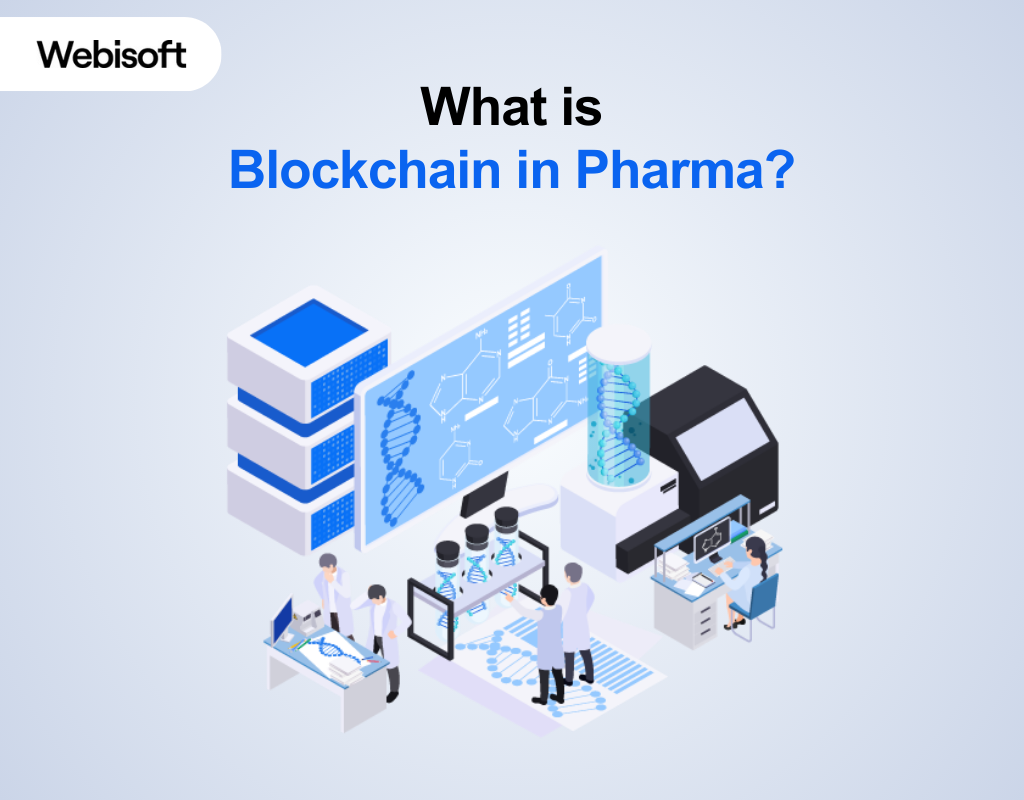
Blockchain in pharma is a technological innovation that transforms how information is managed in the pharmaceutical industry. It’s a secure digital ledger that keeps a record of everything related to medicines, from where they’re made to how they’re distributed.
This technology makes sure medicines are genuine. The process is transparent and secure. It’s a big step in making sure the pharmaceutical industry works better and is more trustworthy.
How can Blockchain Benefit Pharmaceutical Industries?
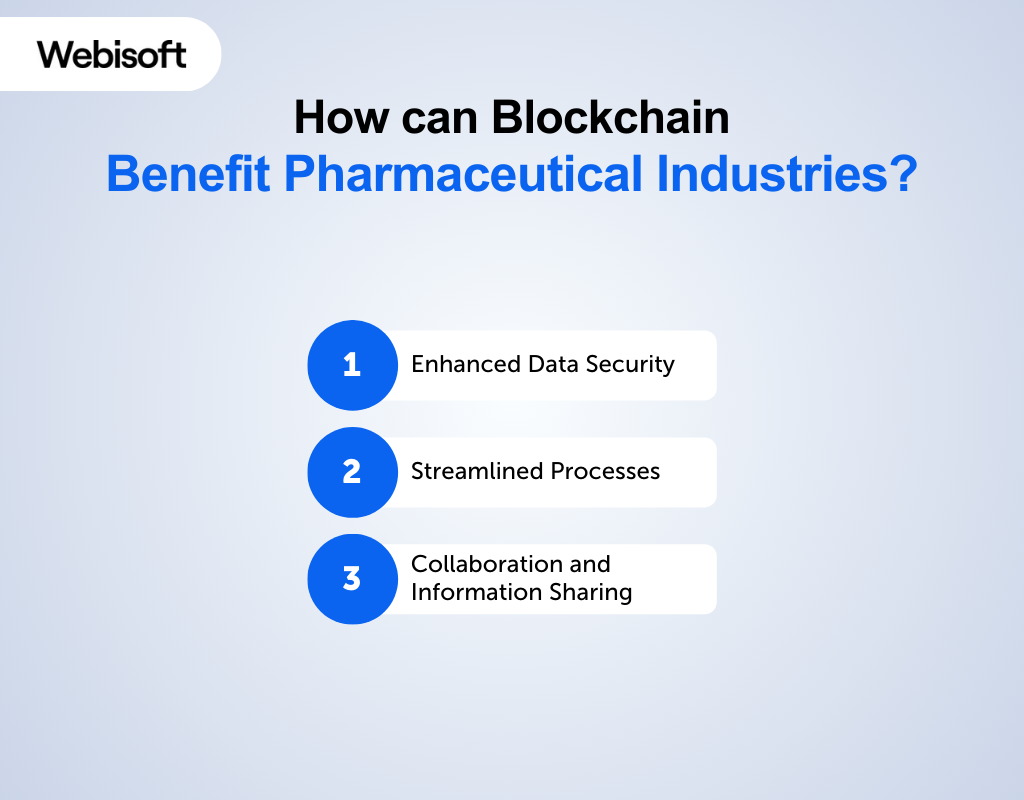
Blockchain technology can significantly benefit the pharmaceutical industry by enhancing the security, transparency, and efficiency of various processes. Here are some key ways in which blockchain can make a difference:
Counterfeit Drug Prevention
Blockchain can provide a secure and unchangeable record of every transaction in the drug supply chain, from manufacturing to delivery to the end consumer. This traceability helps in verifying the authenticity of drugs, effectively combating the distribution of counterfeit medications, which is a major concern for public health and pharmaceutical companies.
Supply Chain Management
Blockchain offers real-time visibility and traceability throughout the entire supply chain. This can help pharmaceutical companies monitor the production, shipment, and distribution of drugs more efficiently, ensuring that the products meet safety standards and regulations. It can also streamline recalls by quickly identifying and tracing the distribution of affected drugs.
Clinical Trials and Research Data Management
Blockchain can secure and streamline the management of clinical trials and research data. Providing a tamper-proof ledger, it ensures the integrity of clinical trial records and research results, facilitating the verification of data authenticity and compliance with regulatory requirements. This transparency can also improve collaboration between researchers and organizations.
Regulatory Compliance and Quality Control
The immutable nature of blockchain records simplifies compliance with regulatory standards and quality control measures. It provides an auditable trail of data that can easily be reviewed by regulatory bodies, reducing the risk of compliance issues and enhancing the overall quality of pharmaceutical products.
Patient Data Security and Privacy
Blockchain Pharma can improve the security and privacy of patient data by providing a decentralized platform for storing and sharing medical records. Patients can control access to their data, ensuring that their information is shared securely with healthcare providers and researchers, in compliance with data protection regulations.
Smart Contracts for Automatic Transactions
Smart contracts on blockchain can automate various transactions in the pharmaceutical industry, including payments, licensing, and supply agreements. These contracts automatically execute when predefined conditions are met, reducing administrative costs and eliminating the need for intermediaries.
Streamlined Payments and Billing
Blockchain can simplify the billing and payment process in the pharmaceutical industry by providing a transparent and efficient system for transactions between manufacturers, distributors, healthcare providers, and insurers. This reduces administrative costs and delays associated with traditional payment systems.
Enhanced Collaboration and Innovation
By providing a secure and transparent platform for data sharing, blockchain can facilitate collaboration between pharmaceutical companies, researchers, and healthcare providers. This can accelerate the development of new drugs and therapies, driving innovation in the industry.
Use Cases of Blockchain in Pharmaceutical Industry
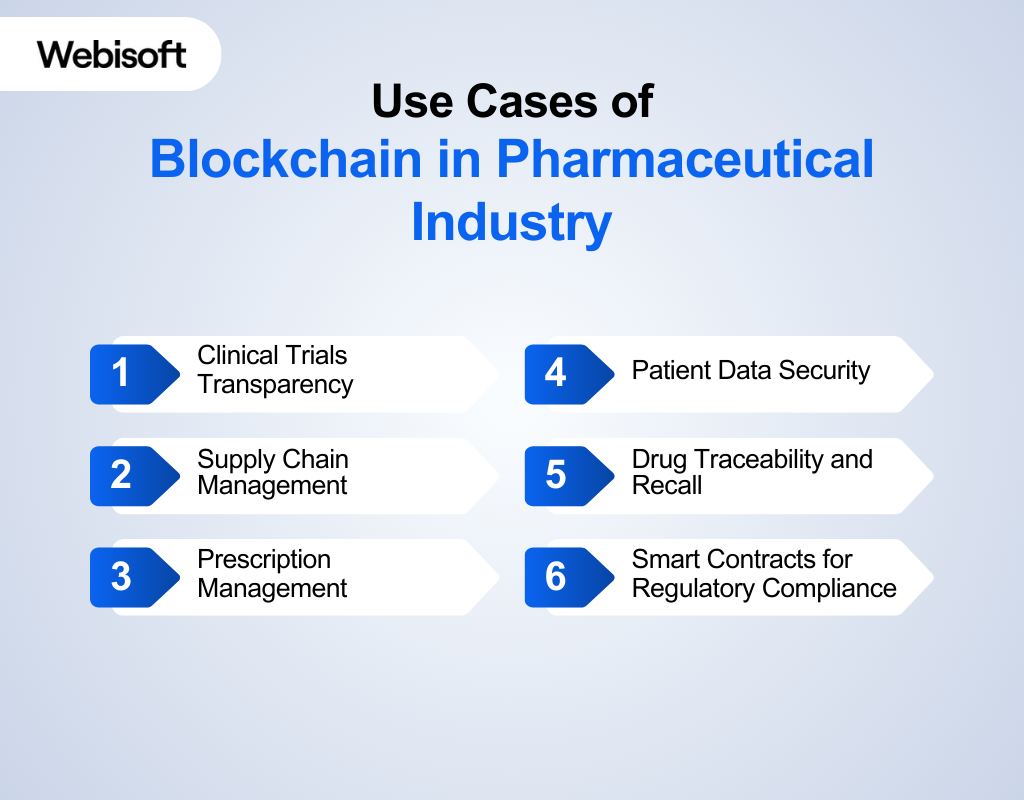
Let’s explore some of the use of blockchain in pharmaceutical industry:
Drug Traceability and Anti-counterfeiting
Blockchain provides a transparent and immutable ledger for tracking the production, distribution, and sale of pharmaceuticals. By recording every transaction in the drug supply chain, blockchain makes it much harder for counterfeit drugs to be introduced into the market. This not only protects patients but also safeguards the integrity and reputation of pharmaceutical brands.
Supply Chain Management
The technology enhances supply chain visibility and management by offering real-time tracking of drug shipments. This includes monitoring storage conditions, such as temperature and humidity, crucial for maintaining drug efficacy. Blockchain can also streamline recalls by precisely identifying the location of specific batches of drugs, making the process faster and more efficient.
Clinical Trials Data Management
Blockchain can secure and streamline the management of data from clinical trials by ensuring that records are tamper-proof and verifiable. This improves the reliability of trial outcomes, protects patient information, and simplifies the process of sharing data with regulatory bodies, all while maintaining data integrity and confidentiality.
Regulatory Compliance and Auditing
The immutable nature of blockchain records simplifies the process of demonstrating compliance with regulatory standards. With a transparent audit trail, companies can easily provide necessary documentation to regulatory bodies, reducing the complexity and cost of audits and ensuring faster market access for new drugs.
Intellectual Property Protection
Blockchain can be used to securely manage and document intellectual property rights and patents within the pharmaceutical industry. This includes recording the development process of new drugs, and ensuring that innovation is adequately protected and rewarded.
Patient Data Management
By utilizing blockchain, pharmaceutical companies and healthcare providers can ensure the secure and private storage of patient health records. Patients have control over who accesses their data, enhancing privacy and security and enabling better patient consent management for clinical trials.
Smart Contracts for Efficient Transactions
Smart contracts automate and implement agreements without intermediaries, simplifying processes such as payments, licensing agreements, and supply contracts. This reduces administrative costs and enhances efficiency within pharmaceutical operations and transactions.
Direct-to-Patient Communication
Blockchain can facilitate direct and secure communication channels between pharmaceutical companies and patients. This can be used for patient education, drug adherence monitoring, and feedback collection, improving patient engagement and treatment outcomes.
Transparent and Ethical Sourcing
Blockchain can verify the ethical sourcing of materials used in pharmaceutical products, ensuring that all components comply with environmental and labor standards. This transparency is increasingly important to consumers and regulatory bodies.
Research and Development Collaboration
Blockchain platforms enable secure and transparent sharing of research data among pharmaceutical companies, research institutions, and universities. This fosters collaboration, accelerates drug discovery, and allows for more efficient development of new treatments.
Limitations of Blockchain Technology in Pharma Industry
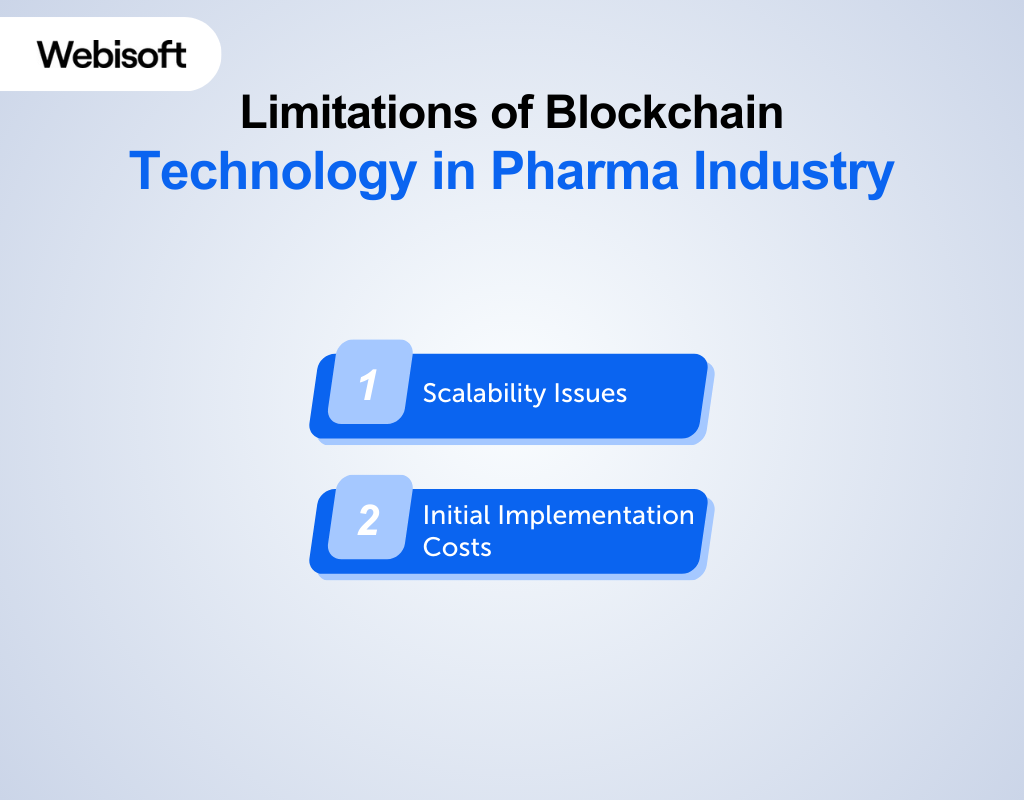
While blockchain technology offers significant benefits to the pharmaceutical industry, some limitations and challenges need to be addressed for its effective implementation and widespread adoption. Here are some of the key limitations:
Scalability
Blockchain technology, especially in its current forms, can face scalability issues. The amount of data that can be processed and stored on the blockchain is limited by the size of the blocks and the interval between them. For industries like pharmaceuticals, where vast amounts of data are generated and need to be processed quickly, scalability can be a significant hurdle.
Integration with Existing Systems
Integrating blockchain technology with existing pharmaceutical industry systems and databases can be complex and costly. Many companies use legacy systems that are not readily compatible with blockchain, requiring substantial investment in time and resources to bridge these technologies.
Regulatory Uncertainty
The regulatory sector for blockchain is still evolving, with significant variations between different countries and regions. This uncertainty can make it difficult for pharmaceutical companies to ensure that their blockchain applications are compliant with all relevant laws and regulations, particularly those relating to data privacy and security.
Privacy Concerns
While blockchain can improve data security, its transparency poses challenges to privacy, especially regarding sensitive patient data and proprietary business information. Ensuring that blockchain applications in the pharmaceutical industry comply with data protection regulations like GDPR is crucial but can be challenging.
Future of Blockchain in Pharma
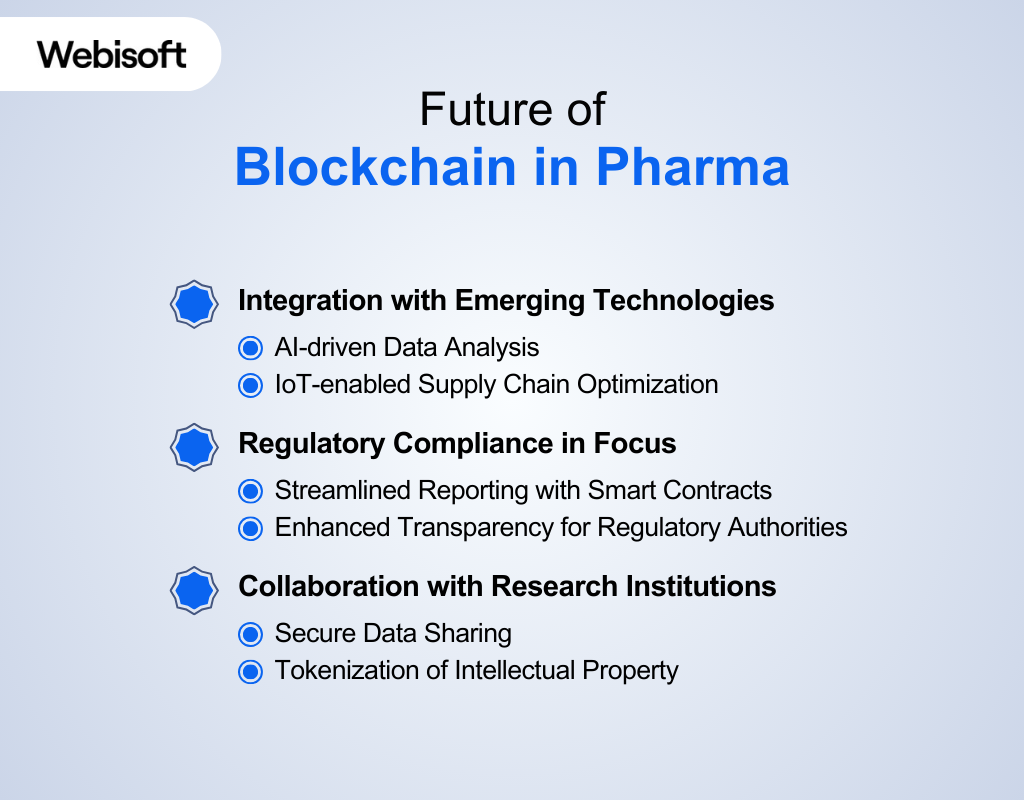
The future of blockchain in the pharmaceutical industry looks very bright, with exciting developments on the way. As technology progresses, we’re going to see big changes in how the industry operates and sets its standards.
Here are some of the key areas where blockchain is set to make a big impact:
Collaboration with New Technologies
Blockchain is expected to collaborate with cutting-edge technologies like artificial intelligence (AI) and the Internet of Things (IoT). This combination has the potential to completely change how things work in the pharmaceutical world.
Smarter Data Analysis with AI
By linking blockchain’s secure record-keeping with AI’s ability to sift through huge amounts of data, we’re looking at a future where we can get deeper insights into drug development, clinical trials, and industry trends than ever before.
Supply Chain Gets Smarter with IoT
When you bring blockchain together with IoT, you can track and manage the supply chain in real time. This means better control over the quality of pharmaceutical products and smarter ways to manage stock levels and distribution.
Keeping Up with Regulations
The pharmaceutical industry has to follow a lot of rules, and blockchain is becoming a key tool in making sure companies stay in line with these regulations. It offers clearer and more accountable ways to keep track of compliance.
Simplifying Reports with Smart Contracts
Smart contracts on the blockchain can make regulatory reporting much smoother by automating many of the steps. This means less room for error and an easier way to meet the strict standards of the industry.
Improved Transparency for Regulatory Authorities
Blockchain’s open and unchangeable records mean that regulators can easily check the data they need. This not only speeds up regulatory checks but also builds a stronger trust between the industry and regulatory agencies.
Secure Data Sharing
With blockchain, sharing valuable research data becomes safer and more efficient, speeding up the process of drug discovery and development. It ensures that data stays accurate and secure, avoiding duplication and promoting teamwork in scientific research.
Tokenization of Intellectual Property
Blockchain allows for the “tokenization” of intellectual property, making it easier to manage patents, licensing, and rights in a way that’s fair and transparent. This could lead to a more open and honest research environment.
Why Should You Choose Webisoft for Implementing Blockchain in Pharmaceutical
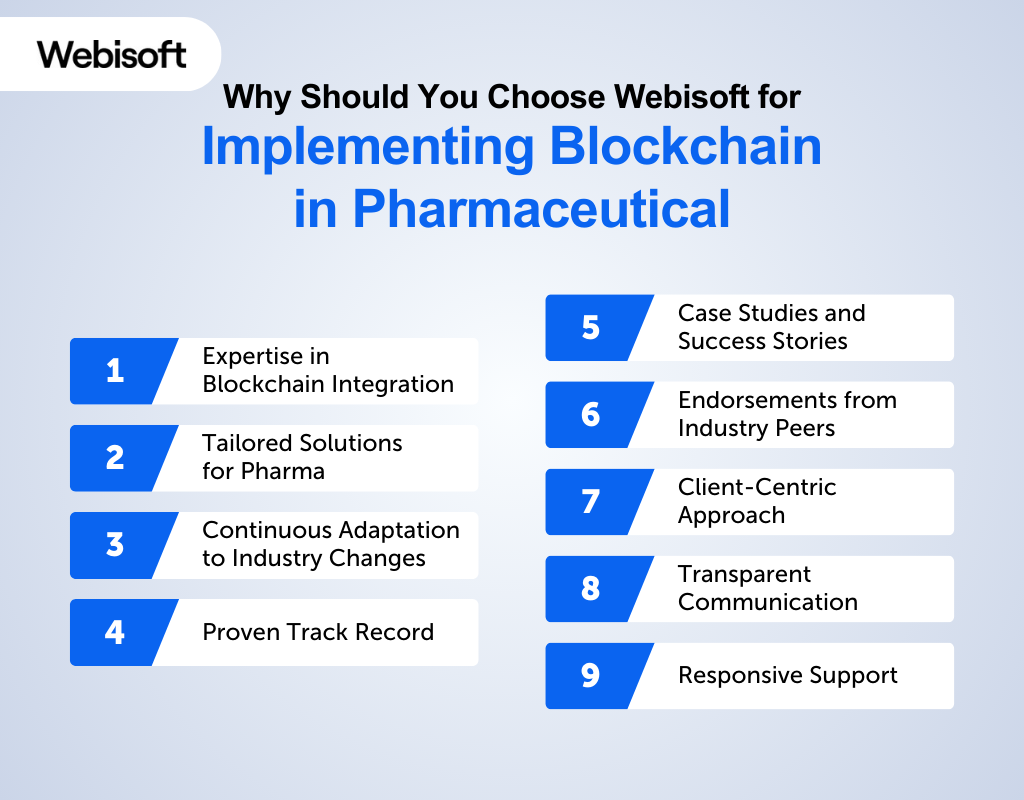
Choosing Webisoft for your blockchain implementation in the pharmaceutical industry positions your company at the forefront of innovation and efficiency.
Here are compelling reasons why partnering with Webisoft can transform your pharmaceutical operations:
Deep Industry Expertise
At Webisoft, we possess a profound understanding of the pharmaceutical industry’s unique challenges and requirements. Our team combines blockchain expertise with extensive pharmaceutical knowledge, ensuring that our solutions are not only technologically advanced but also perfectly aligned with industry standards and practices.
Custom Blockchain Solutions
We recognize that one size does not fit all in the complex pharmaceutical landscape. That’s why we specialize in creating customized blockchain solutions customized to address your specific needs, whether it’s improving drug traceability, securing clinical trial data, or simplifying supply chain management.
Proven Track Record
Our portfolio showcases a series of successful blockchain implementations across the pharmaceutical sector. We have helped companies achieve remarkable improvements in operational efficiency, data integrity, and regulatory compliance, making us a trusted partner in blockchain innovation.
Cutting-Edge Technology
Webisoft stays at the cutting edge of blockchain technology, incorporating the latest advancements and innovations to ensure your solutions are not only effective today but also scalable and future-proof. We leverage interoperable, efficient, and sustainable blockchain platforms suited to the high demands of pharmaceutical operations.
Regulatory Compliance
Understanding the regulations is crucial in the pharmaceutical industry. We design our blockchain solutions with compliance at their core, ensuring they meet stringent regulatory standards, including data privacy laws and Good Manufacturing Practices (GMP).
Enhanced Security and Privacy
With blockchain’s security features, we place a high priority on protecting sensitive data, including patient information and proprietary research. Our solutions improve data integrity and security, giving you peace of mind that your information is protected against unauthorized access and tampering.
Collaborative Approach
At Webisoft, we believe in a collaborative approach to project management. We work closely with our clients at every step, from initial consultation to deployment and beyond, ensuring your vision is realized and that the solution perfectly matches your operational needs.
Final Note
To sum it up, we’ve explored the importance of integrating blockchain in pharmaceutical industry. We’ve looked at the advantages it brings, studied real-world examples of its applications, and recognized the challenges it can present.
Throughout our exploration, we’ve highlighted how blockchain enhances security, transparency, and efficiency within the pharmaceutical supply chain. We’ve also seen how it empowers various stakeholders and ensures greater compliance.
So, are you ready to experience the transformative potential of blockchain in pharmaceutical sector? Connect with Webisoft today and start a journey that changes the usual ways, making things better and faster in what you do.
FAQs
How does blockchain address the issue of pharmaceutical waste in the supply chain?
Blockchain, through its transparent ledger, can facilitate the tracking of pharmaceutical waste in the supply chain. Recording disposal and wastage data enable stakeholders to identify inefficiencies, reduce waste, and make informed decisions for more sustainable practices.
Can blockchain technology help in the prevention of medication errors in healthcare settings?
Yes, blockchain can play a role in preventing medication errors by ensuring a secure and unalterable record of prescription data.
How does blockchain contribute to patient privacy in the context of pharmaceutical data?
Blockchain enhances patient privacy by providing a decentralized and secure platform for storing sensitive healthcare data. Patients can have more control over who accesses their information, reducing the risk of unauthorized access and maintaining confidentiality.
What is Smart Pharmaceutical, and how does it utilize blockchain technology in healthcare?
Smart Pharmaceutical refers to medications that use blockchain pharma technology in healthcare. They utilize blockchain for secure tracking, traceability, and transparent management of pharmaceuticals, improving patient safety and supply chain efficiency.
